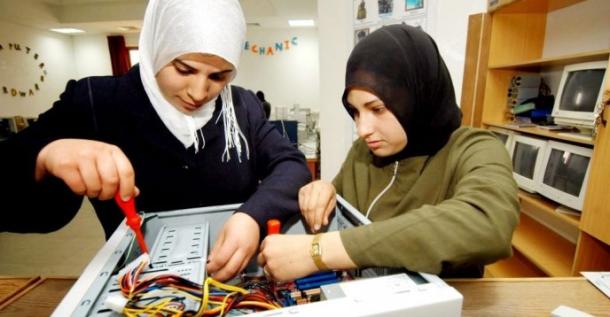Article
Recognition, Validation and Accreditation in Pakistan

Jump to case study
Recognition of Prior Learning (RPL) is not only beneficial for traditionally disadvantaged groups but is also relevant for empowering youth and early school leavers. RPL is a way of recognizing and respecting different ways of knowing, particularly those acquired through the traditional apprenticeship system known as the Ustad-Shagird system. RPL is also considered a bridge between non-formal and formal learning and a reliable way to evaluate non-classroom learning for the purpose of facilitating certification, meeting job requirements and achieving academic credit or transfer. All these points relate to the growing stakeholder perception placed on learning outcomes, on what someone knows and can do, and to the contribution of RPL in promoting social inclusion and enhancing learning and employment opportunities.
Challenges and opportunities
The 18th Amendment in the 1973 Constitution of Pakistan[1] decentralized legislative power with regard to educational affairs to all existing eight provinces.[2] However, while the provinces have been given key roles in educational policy formulation, curriculum and standard setting, the lack of educational responsibility at the federal level has meant that educational sectors are fragmented and uncoordinated, so that equivalencies and certificates may be recognized at the provincial level but not necessarily at the federal level.
Pakistan is also facing immense socio-economic challenges caused in part by the ongoing conflict with the Taliban, as a consequence of which, hundreds of Pakistanis are being displaced. Such challenges affect the education sector as can be seen in the literacy rates which are at 65 per cent for men and 42 per cent for women. These rates have, in turn, negatively affected the labor market and the country’s rate of economic growth.
Challenges in the Technical Vocational Education and Training (TVET) sector include: (1) limited capacity of the training system to provide necessary programs; (2) disparity between learning outcomes and market needs; (3) limited pathways to facilitate flow between TVET and formal education systems; and (4) lack of nationally-recognized standards[3] for competences so that each institution issues its own certificate, which may or may not be recognized at the level of the province. Such practice leads to a reduction of the economic value of training and provides little transparency and confidence to employers in selecting and hiring graduates.
Participation in TVET is also low. With regard to formal TVET (NAVTEC, 2009), in 2009, there were only 315,000 students enrolled across 1,522 technical and vocational education and training institutes. As regards non-formal learning, a huge number of Pakistani workers have received their training based upon Ustad-Shagird system. Several short term (three months to one year) courses conducted by vocational institutes are also available requiring a Class 8 pass for entry that lead to the grade of a skilled worker. But such courses are only recognized at the provincial level and not at a federal level.
In the world of work, only 6 per cent of Pakistani workers has acquired vocational and technical skills through the formal TVET system; 2.5 per cent gain their skills through on-the-job training in the formal sector.
National standards, policy and framework activity
Given the importance of human resource development, the government, as part of its National Skills Strategy 2009-2013, has made skills development a joint federal and provincial responsibility. In line with this strategy, Pakistan designed the National Qualifications Framework (NQF), with the central aim of bringing together all national qualifications under one coherent system (NAVTEC, 2009) and accommodating all kinds of learning, whether formal, non-formal or informal (from both public and private providers). As part of the TVET Reform Support Program, NQF developments have focused on the TVET sub-framework called the National Vocational Qualifications Framework (NVQF) (NAVTTC, 2012). It consists of six vocational levels and two prevocational levels. Depending upon the establishment of equivalencies and the skill level one achieves, the NVQF is able to support the recognition of learning outcomes and competences from any learning setting leading to the award of a qualification equivalent to a secondary school certificate, a higher secondary school certificate and/or a bachelor’s degree. These certificates allow an individual to enter further higher education. Currently, non-formal education and training programs – such as short-term vocational courses, distance learning or workplace learning – run parallel to the mainstream education programs; however, the goal of the government through the NQF is to put the quality and standards of non-formal learning programs on a par with and equivalent to formal education and training programs and accommodate them within the national qualifications framework.
Stakeholder engagement. Several stakeholders have been involved in the development of the NQF, recognition and certification mechanisms, and the TVET sector reform processes. Public and private sector, especially practitioners from various industries, and professional associations such as the Federation of Pakistan Chambers of Commerce and Industry (FPCCI) are all involved in the process of curriculum development in order to increase the relevance of training for employers and increase workers’ employability. The National Vocational and Technical Training Commission (NAVTTC) is the main authority for implementing RPL in relation to the learning outcomes based standards in the NVQF. These federal agencies cooperate with the provincial Technical and Vocational Training Authorities (TEVTA).
Many projects are implemented by international and bilateral assistance. The “TVET Reform Support Program” is implemented by the Deutsche Gesellschaft für Internationale Zusammenarbeit (GIZ) GmBH (German Agency for International Cooperation and Development) in cooperation with the NAVTTC and TEVTAs. The Program is co-funded by the European Union, the Embassy of the Netherlands and the Federal Republic of Germany.
References
- de Voogd, Jan and Qureshi, Muhammad Iqbal. 2011. Labour Market Information: A situational analysis of Pakistan. Islamabad, Project Office, GIZ.
- Eighteenth Amendment. 2010. (Accessed 10 August 2015).
- Federal and Provincial Roles and Responsibilities in Education. Eighteen Constitutional Amendment. (Accessed 10 August 2015).
- German Agency for International Cooperation and Development (Deutsche Gesellschaft für Internationale Zusammenarbeit) (GIZ). 2013. Supporting TVET Reform in Pakistan. Progress Report – 1 April 2012 to 31 March 2013. Islamabad, Project Office, GIZ.
- National Vocational and Technical Education Commission (NAVTEC). 2009. National Skills Strategy 2008-2013. Islamabad, Prime Minister’s Secretariat.
- National Vocational and Technical Training Commission (NAVTTC). 2012. The National Vocational Qualifications Framework (NVQF): Framework with level descriptors and rules for managing the National Vocational Qualifications Framework. Islamabad, Prime Minister’s Secretariat.
- UNESCO Institute for Lifelong Learning (UIL). 2014. Global inventory of regional and national qualifications frameworks. Country Case studies compiled by the UNESCO Institute of Lifelong Learning. Hamburg, UIL.
- World Bank. 2009. National Qualifications Framework and Technical Vocational Education and Training in Pakistan. South Asia: Human Development Unit, Report No. 26. Washington DC, World Bank.
- World Bank. 2011. World Bank Supports Vocational Training to Boost Employment for Youth in Pakistan. The World Bank Group. Washington DC, World Bank.
Partner/s
Aktar Naeem Muhammad r,
GIZ
Islamabad
With assistance from:
Arshid Kamal
Former intern at: UNESCO Institute for Lifelong Learning
Hamburg
Germany
[1] Enacted 19 April 2010.
[2] On August 29, 2009, Gilgit-Baltistan was granted a status as an autonomous province.
[3] Each institution issues its own certificate, which is sometimes recognized by the province. There is no national recognition of these standards.
Case study
RVA case study in training and the world of work
The RVA pathway to skills certification
In the context of Pakistan’s National Vocational Qualifications Framework (NVQF), a learner may achieve any of the following qualifications: (1) one of the national vocational certificates at levels one to four; or a diploma at level five. There are three pathways for any citizen to receive these qualifications: (1) training in an institution of the formal system; (2) on-the-job workplace and non-formal training including apprenticeship training; and (3) Recognition of Prior Learning (RPL) and/or Recognition of Current Competencies (RCC). An assessment using competency-based standards is conducted to determine the type of certification one can receive following any one of the three pathways.









